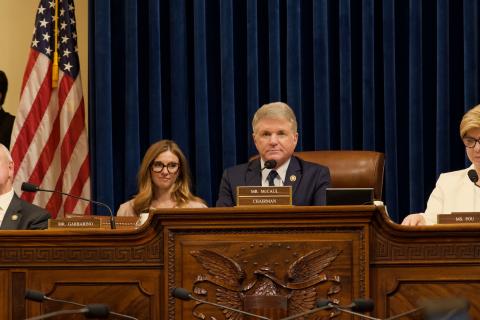Chairman McCaul Delivers Opening Remarks at Task Force on Securing the Homeland for Special Events Inaugural Hearing
WASHINGTON – Today, Congressman Michael McCaul (R-Texas) — chairman of the bipartisan Task Force on Enhancing Security for Special Events — held the task force's first hearing, entitled "Lessons Learned: An examination of historic security incidents at mass gatherings.” Chairman McCaul highlighted several previous attacks on mass gatherings and emphasized the need for federal and state level cooperation in preventing future security incidents ahead of major events planned in the United States, including the 2026 FIFA World Cup and the 2028 Olympics.

Full Transcript of Opening Remarks:
I'd like to welcome everyone to this inaugural hearing of the bipartisan House Committee on Homeland Security's Task Force on Enhancing Security for Special Events in the United States. In the coming decade, the United States will host millions of international travelers for several major national and international special events, including the FIFA World Cup, the celebration of the United States 250th birthday in 2026, and the Los Angeles Summer Olympics of 2028.
Though these events present an opportunity to showcase everything that makes America great, we cannot forget that our adversaries and other violent extremists will view these events as targets for inflicting mass casualties and generating fear.
To that end, I'm honored to chair the task force and lead the committee's efforts in investigating and conducting oversight of the security needs of these major national and international events. Our goal is to develop and advance legislative solutions that will enhance our preparedness and security posture against all threats, and I look forward to working with the ranking member of the task force, Mrs. Nelly Pou of New Jersey, and with all the members assigned to this task force to empower state and local law enforcement and other first responders to carry out their missions.
As we prepare to secure the major events ahead, this task force must begin by learning from past failures both here and abroad. In the United States, we've seen deadly attacks at mass gatherings: the 1996 Olympic bombing in Atlanta and the 2025 New Year's Day attack in New Orleans. Abroad, the 1972 Munich Olympics, which are still emblazoned in my mind, saw terrorist murder [11] Israeli athletes after exploiting security gaps. In addition, in 2015, ISIS launched coordinated attacks across Paris, killing 130.
These tragedies make clear the cost of complacency, and we owe it to the American people to confront these lessons and ensure we don't repeat them. This hearing is the first step.
Today’s historic focus will lead us to discuss and consider [events] like the instance of vehicular terrorism on January 1st of this year in New Orleans, the crowd security breach at the Copa América final game at Miami Hard Rock Stadium last year, and the Kansas City parade shooting early last year.
We will also discuss the 2013 Boston Marathon Bombing, which occurred during my tenure as chairman of this committee. And, Commissioner Davis, it's great to see you again. We worked well together in our oversight and investigating the activities following that tragedy to find a constructive outcome so that something like that couldn't happen again.
So, we look forward to hearing from our witnesses on these challenges, what we can do better and more importantly, we want to know what more Congress and the federal government can do to strengthen security ahead of these major events.
One clear lesson from the past attacks is the need for strong intelligence sharing. Our state and local law enforcement rely on timely information from the federal intelligence community, especially our fusion centers. With rising tensions in the Middle East and the threat of Iran backed actors operating inside the United States, raising awareness and coordination is critical to stopping potential attacks before they happen.
Earlier this month, Congress passed — and the president signed into law — supplemental funding for the World Cup and the Los Angeles Olympics, which will be used in part to enhance information sharing. That same information sharing is critical in stopping human trafficking, which we see unfortunately all too well at these events. With millions of international visitors expected, criminal networks will look to exploit.
We also face a growing threat from drones. According to the NFL, there were over 2,800 drone incursions at stadiums during the 2023 season — a 4,000-percent increase from just five years prior. With minimal skill, bad actors can use these drones to launch attacks or create chaos. Yet most state and local agencies lack the authority to respond. We need to equip federal agencies so they can help the state agencies and close the gap to make these events safe.
We have a lot of work to do ahead of these events. I hope this hearing is a strong first step to ensure the incidents we discuss today will never happen again, and that the United States remains a global leader in providing safe and secure experiences for citizens and visitors alike.
###